Read and report vaccine reactions, harassment and failures.
Respiratory Syncytial Virus (RSV) Disease & Vaccine Information

Respiratory Syncytial Virus (RSV): The Disease
Respiratory Syncytial Virus (RSV) is a common and highly contagious respiratory virus that produces cold symptoms such as coughing, sneezing, wheezing, decreased appetite, fever and malaise. Most people who become infected with RSV will recover fully within a week or two without treatment.
Young infants and children, older adults, and individuals with immune system disorders and chronic health conditions are at an increased risk of RSV infection and may also be at an elevated risk of developing complications from the illness. Complications of RSV infection include inflammation of the small airways within the lungs (bronchiolitis) and lung infection (pneumonia) and may require hospitalization for supportive care.
On July 17, 2023 the FDA approved the drug nirsevimab under the trade name Beyfortus, a monoclonal antibody, for the prevention of RSV. Though the CDC has determined that it can define nirsevimab as a vaccine for their purposes, nirsevimab is not classified as a vaccine by the FDA, American Medical Association, or the World Health Organization. To learn about nirsevimab, visit NVIC’s RSV Prevention and Treatment page.Click to read more about RSV disease
Respiratory Syncytial Virus (RSV): The Vaccine
Two RSV vaccines are licensed for use in the US by the Food and Drug Administration (FDA). AREXVY by GlaxoSmithKline (GSK) is approved for use in individuals 60 years of age and older and ABRYSVO by Pfizer is approved for individuals 60 years of age and older and for use in pregnant women for the prevention of RSV disease in their newborns. Neither vaccine demonstrates the ability to prevent transmission of RSV. AREXVY RSV vaccine efficacy peaks within two months of administration, and offers no protection at one year. A booster dose of AREXVY given one year later does not offer any additional benefit.
ABRYSVO RSV vaccine is assumed to offer persistent protection for 7 months but is no longer effective by 24 months. The CDC recommends use of RSV vaccines in all persons 60 years and older, based on “shared clinical decision-making”. This recommendation means that eligible individuals may choose to receive the vaccine if they believe that the benefits of vaccination outweigh the risks. RSV vaccines are also recommended for pregnant women, between 32- and 36-weeks’ gestation during the season when RSV is actively circulating. Click to read more about RSV vaccine
Respiratory Syncytial Virus (RSV) Quick Facts
Respiratory Syncytial Virus (RSV)
- The virus is contagious and is transmitted through coughing and sneezing, by coming into direct contact with the virus, and by touching a surface that contains the virus and then touching your face. Young infants, children, older adults, and individuals with immune disorders and underlying chronic health conditions are more at risk of developing RSV infection and suffering from complications of the illness. By two years of age, most infants and children will have had RSV; however, it is possible to have more than one infection throughout a lifetime.
- Most individuals who develop an RSV infection will recover fully within one to two weeks without treatment. There are no specific treatments for RSV infection and symptoms can be treated with over-the-counter pain and fever medication, rest, and adequate hydration. Two monoclonal antibodies, Beyfortus (nirsevimab-alip) and Synergis (palivizumab), have been approved for use by the FDA for the prevention of RSV illness in infants and young children up to two years of age. These drugs, however, are not approved for the treatment of RSV infection. Click to read more Quick Facts
Respiratory Syncytial Virus (RSV) Vaccine
- In clinical trials for both ABRYSVO and AREXVY, a higher rate of Guillain-Barre Syndrome (GBS), a rare but serious neurological disorder that causes inflammation of the peripheral nerves, was reported among individuals who received the vaccine. There was also a higher rate of atrial fibrillation, a serious heart disorder that may lead to complications such as stroke, heart attack, or heart failure, among vaccine recipients.
- In clinical trials, pregnant women who received ABRYSVO had higher rates of preterm deliveries, as well as higher rates of pre-eclampsia (complication of pregnancy with symptoms that include high blood pressure, swelling of the hands and feet, and protein in the urine and gestational hypertension). Click to read more Quick Facts



